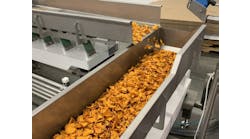Officials at Tyson Foods, Inc. (Springdale, Ark.) announced Feb. 15 that they are consolidating beef operations in northeast Nebraska as part of the company's strategy to operate more efficiently and maintain best cost management practices.
Effective this week, Tyson will permanently close its beef processing plant in Norfolk and beef slaughter plant in West Point. Production will be shifted primarily to the company's beef complex in Dakota City, Nebraska, which is completing a new beef processing addition.
The new 84,500-square-foot structure at Dakota City is scheduled to begin production in March and will be able to absorb the work currently performed in Norfolk. The West Point closing will enable Tyson to make more efficient use of beef slaughter operations at Dakota City and other Tyson beef plants in the region. At current production levels, the plant closings will increase the company's beef production capacity utilization by approximately six percent.
"Given the expected efficiencies of the new processing floor at Dakota City and the anticipated improvements in capacity utilization, we believe this is the right strategic decision," said Noel White, group vice president of Tyson Fresh Meats. "The consolidation will enhance the performance of our beef business, both now during this time of challenging market conditions and later when these conditions improve."
The plant closings affect approximately 365 Team Members at West Point and 1,300 at Norfolk. The last day of production at West Point will be Feb. 15, while the last full day of operations at Norfolk will be Friday, Feb. 17. The one exception will be the plant's forward warehouse, which will continue to operate for at least another 30 days.
Even though the plants will be closed, workers at both locations will continue to be paid and receive benefits for 60 days and will be asked to report for meetings to discuss benefits, as well as employment opportunities within the company. Tyson representatives will conduct small group meetings with affected workers to explore ways they can maintain employment with the company.
Affected Team Members will be encouraged to consider transferring to other Tyson plants, such as company beef facilities at Dakota City and Lexington, Neb., as well as Emporia, Kan. The company will offer cash relocation incentives. Tyson will also work cooperatively with Nebraska Workforce Development officials who will provide employment assistance.
"We regret the disruption the closings will cause our Team Members and these two outstanding plant communities, which both have a long history in the meatpacking industry," said John Tyson, chairman and CEO of Tyson Foods, who visited Norfolk and West Point in early 2005 when the plants there were temporarily closed for five weeks because of unfavorable market conditions. "We've worked hard over the past year to try to keep these plants open and I appreciate everyone's efforts. However, we've concluded we can operate more efficiently by permanently consolidating operations. I thank our Team Members for their support and want them to know we will do our best to help them find work at another Tyson location."
The more efficient use of beef processing capacity, together with reduced costs from the facility closures, are estimated to generate annual pre-tax cost savings of approximately $40 million, a portion of which is estimated to be generated in the last six months of the current fiscal year. The facility closings are expected to result in a charge to Tyson's second quarter earnings of approximately $46 million or $0.08 per share. This includes a non-cash charge of $36 million. Accordingly, Tyson now expects fiscal 2006 earnings to range from $0.42 to $0.72 per share. As reported in the company's first quarter earnings release, the company's business continues to be affected by tight cattle supplies, an abundance of protein, interruptions in export market access and soft international demand.
Company officials have not yet determined the future disposition of the plants and related property. However, they indicate they will explore alternative uses for both facilities.
IBP, Inc., now Tyson Fresh Meats, purchased the West Point plant in 1967 from Armour & Co. IBP bought the former BeefAmerica plant in Norfolk in 1998 and after extensive renovation began beef processing operations in 2000. IBP was acquired by Tyson Foods in September 2001.
Tyson's remaining Nebraska operations include beef plants at Dakota City and Lexington, a pork plant at Madison, a bacon operation in Omaha and a prepared foods facility in York. Including West Point and Norfolk, the company employs 9,865 Team Members in Nebraska.

